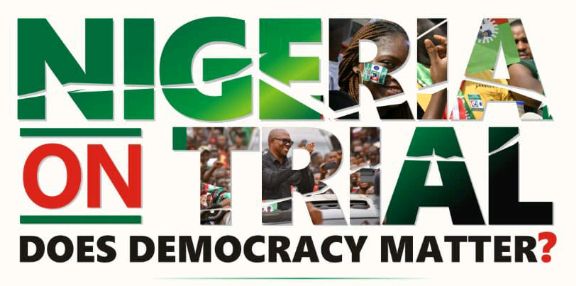THE TRIAL OF DEMOCRACY IN NIGERIA
Published on 30 April 2025
-- Tinubu as a democrat ...

-- A drift to one party system ...
-- The suspension of Democratic rule in Rivers state ...
TINUBU AS A DEMOCRAT AND MANY PROTESTS
President Bola Ahmed Tinubu GCFR undoubtedly played a pivotal role in Nigeria\'s return to democracy following the dissolution of the Senate by the then-military Head of State, Sani Abacha, in 1993. At the time, Tinubu was a senatorial candidate for the Lagos West senatorial district in the Third Republic under the banner of the Social Democratic Party.
Tinubu transformed into an activist, advocating for the return of democracy as part of the pro-democracy National Democratic Coalition (NADECO). This group mobilized support for the restoration of democracy and the rule of law.
As a democrat, Tinubu, during the military era, was among Nigerians who voiced their opposition to dictatorship. He participated in protests to press for democratic reforms, agitating for true democracy, the rule of law, and robust national institutions devoid of federal government interference.
Under the guise of democratic activism, Tinubu joined the 2012 Occupy Nigeria protest against President Goodluck Jonathan\'s petrol subsidy removal. The protest aimed to force President Jonathan to rescind his decision to raise the premium motor spirit (PMS) from N87 to N145.
Other notable figures who participated in the protest included former Nigerian Labour Congress President, Mr. Adams Oshiomhole; former President Muhammadu Buhari; Nobel Laureate, Professor Wole Soyinka; former APC Chairman, Mr. John Oyegun; and former Kaduna State Governor, Nasir El-Rufai, among many others.
During the demonstration, Tinubu accused President Jonathan of breaching the social contract with the people, suppressing opposition, and weakening national institutions.
THE DRIFT TO ONE PARTY SYSTEM
Under President Bola Tinubu\'s administration, Nigeria is gradually drifting towards an authoritarian and one-party system, as evidenced by the defections of key opposition figures to the ruling All Progressives Congress.
This trend in Nigerian politics appears to be a deliberate attempt to weaken opposition parties. If sustained, this could potentially erase the country\'s multiparty democracy, with devastating consequences for the nation\'s hard-earned democratic gains.
The imperative to defend democracy and resist authoritarian rule by the ruling APC party cannot be overstated. Indications suggest orchestrated and systematic plans by the ruling party to reduce Nigeria to a one-party state through bribery, blackmail, and coercion.
As Nigeria drifts deeper into a one-party system, the nation becomes increasingly susceptible to dictatorship, where the president may act arbitrarily without regard for external interests, rights, or suggestions. Opposition will be viewed as treasonous and suppressed.
Ultimately, the law will cease to be supreme, and the leaders\' commands will reign supreme. This will foster unbridled corruption, manifesting in nepotism, favoritism, sectionalism, and tribalism. The laws of the land may be amended at will to serve the government\'s interests at the expense of the governed. Tenure elongation and other unconstitutional vices may be committed with impunity.
The consequences will be far-reaching, culminating in civil unrest, armed banditry, kidnapping, armed robbery, insurgency, terrorism, and bloody insurrections. Pent-up grievances and sour emotions against the leadership class will inevitably arise among the masses.
THE SUSPENSION OF DEMOCRATIC RULE IN RIVERS STATE
The President of Nigeria\'s declaration of a state of emergency in Rivers State, specifically the unconstitutional suspension of the democratically elected Governor and members of the State House of Assembly, constitutes a significant threat to the fundamental principles of constitutional governance, the rule of law, and democratic practices in Nigeria.
Although the Nigerian Constitution grants the President certain powers to declare a state of emergency under specific conditions, these powers must be exercised responsibly, proportionately, and within the constitutional framework.
The current situation in Rivers State does not meet the constitutional threshold for declaring a state of emergency, and the suspension of elected officials is a violation of democratic principles. The continued delay in reversing the state of emergency declaration and restoring all democratic structures and institutions in Rivers State, including the reinstatement of the elected Governor, Deputy Governor, and State Legislature, will serve as a manifestation of the disadvantages of a one-party system, where opposition voices are stifled to appease certain political actors. The misuse of emergency powers to suppress political dissent undermines democratic order and can lead to anarchy.
NIGERIA WEAK NATIONAL INSTITUTIONS
The Weak institutions in Nigeria hinder development by leading to corruption, poor governance, and a lack of accountability, ultimately undermining economic growth, social progress, and the well-being of citizens.
Nigeria\'s institutions, such as the Central Bank of Nigeria (CBN), whose former governor diverted huge funds still under probe, the Independent National Electoral Commission (INEC) perceived as an appendage of the ruling party, and the Nigerian National Petroleum Corporation (NNPC) plagued by scandals and misappropriation, exemplify institutional weakness. Similarly, institutions like the Nigerian Communications Commission (NCC) and the Nigerian Ports Authority (NPA) are often associated with widespread corruption, which diverts public attention and resources away from development projects, undermines the rule of law, and erodes public trust.
Poor governance, a consequence of weak institutions, leads to inefficient resource management, lack of transparency, and limited access to justice, further hindering progress. This creates an unstable and unpredictable environment for businesses, making it difficult to attract investment and develop a diversified economy, resulting in a lack of jobs, low productivity, and limited access to financial services for the majority of the population.
Ultimately, this leads to social unrest, conflict, and further undermines the stability of the country and the violation of human rights.


